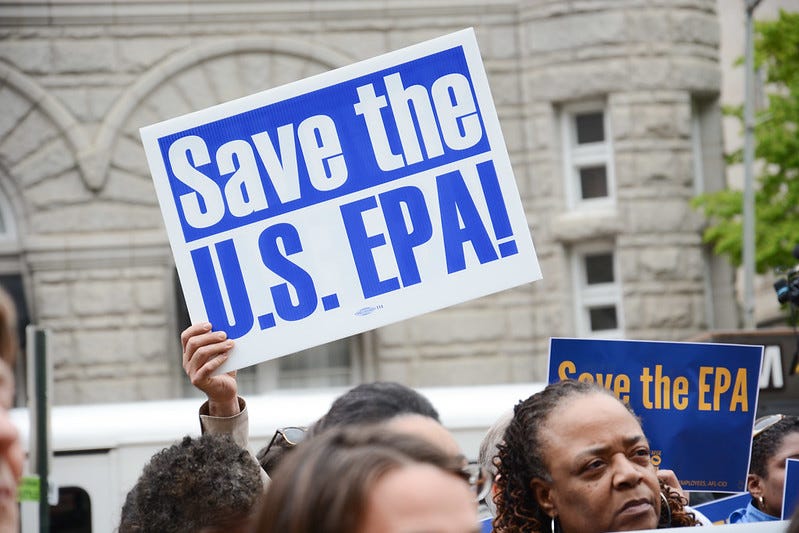Will the Environmental Protection Agency Be Gutted Under Trump?
What Lee Zeldin’s appointment signals. Plus, former EPA officials share their insights, including on addressing climate change risks to hazardous waste facilities.
Credit: AFGE via Flickr (Photo by Chelsea Bland), CC BY 2.0
Among US President-elect Donald Trump’s first announced cabinet picks was his appointment for Administrator of the Environmental Protection Agency (EPA). The selection, announced on November 11, was unexpected. Trump went not with a lobbyist for big polluters or someone who served at EPA during his first term, but with a little-known former Republican congressman from Long Island, New York named Lee Zeldin.
I wrote about Zeldin in a recent article published in Sierra. In short, he has been a proponent of expanding fossil fuel extraction and ran for governor of New York on the promise to end the state’s ban on fracking; he has taken in over $410,000 in campaign donations from the oil and gas industry and he appears to question the scientific consensus on climate change; he voted for a proposal in Congress (among many other ‘anti-environment’ votes) to remove the US from the global climate treaty known as the UNFCCC; and he even received the 2011 “Oil Slick” award from a New York environmental group when he was in the New York state senate for his anti-clean energy and anti-environmental positions.
That is who will be leading the federal agency tasked with protecting the environment and human health. But that is not what EPA’s agenda will be about under the incoming Trump administration. In a video clip of Zeldin being interviewed on Fox News about his new role, he says that he is “excited to get to work to implement Trump’s economic agenda” and plans to roll back regulations starting on day one for the purpose of easing burdens on businesses, as if boosting the economy under Trump’s vision is now EPA’s primary or sole mission.
Zeldin “is joining a Trump administration that has made very clear they are opposed to action tackling climate, are pro-polluter, and will do nothing to protect communities from the ravages of climate change and the health-harming fossil fuel pollution that their cronies will pump out day after day,” Matthew Davis, vice-president of federal policy at the League of Conservation Voters and a former EPA scientist, told me.
There is speculation that Trump (or Musk, perhaps?) may try to have Zeldin completely gut EPA. Project 2025, the right-wing policy blueprint for the next Republican presidential administration, calls for eliminating entire offices in EPA, including the Office of Environmental Justice, the Office of Enforcement and Compliance Assistance, the Office of Public Engagement and Environmental Education, and the Office of Emergency Management. At the very least, we can expect the agency will see an exodus of career civil servants and pretty significant budget cuts.
“As someone who has worked at EPA under two different administrations, under the Obama administration and under the first Trump administration, I know very well that you can’t run an agency like EPA and expect it to do its job to protect clean air, clean water, and communities around the country if you’re gutting the funding that comes in to pay for the enforcement officers, and the scientists,” Davis explained. “The expertise at EPA will suffer with the kinds of budget cuts and purges of civil servants that this administration is already promising to carry out.”
Patrick Parenteau, a professor of law emeritus at Vermont Law School who formerly worked as a regional counsel at EPA, told me that many EPA staff are already preparing to leave the agency and are not waiting around for the axe to drop. “It will not be the same agency after four years,” he said. “Trump will have devastated EPA.”
Climate Risks to Federally-Regulated Hazardous Waste Facilities
“If you’ve got a diminished EPA, you’re going to have a higher risk,” Judith Enck, who served as an EPA regional administrator during the Obama administration, told me. She was talking about the very real climate-related risks facing hundreds of hazardous waste facilities across the US, which are regulated by EPA under the Resource Conservation and Recovery Act (RCRA) of 1976. I wrote about this for a piece published by The New Lede this week, highlighting a recent Government Accountability Office (GAO) report examining climate risks to these RCRA facilities and calling on EPA to do more to address these risks. GAO provided nine recommendations overall to EPA, but Enck and other former EPA officials doubt that the agency will follow through with them under the Trump administration.
“I would assume that this would not become a priority for EPA,” said Walter Mudgan, a former EPA deputy regional administrator.
Enck agreed, saying she doesn’t think we’re going to see prioritization of climate change resiliency or adaptation, let alone climate mitigation, going forward at the federal level and in some (Republican-controlled) states. Implementation and enforcement of the regulations for hazardous waste facilities under RCRA are typically left to the states, and without further direction from EPA on how to assess and manage climate-related hazards like flooding, storm surge, and wildfires, it will be up to states and the facilities themselves to take proactive measures to address these risks.
What happens at the state and even local level, then, will be critically important in the years ahead. That is where any advancements in climate action and environmental protection will have to come from.
“Many of the state governments should look at the GAO recommendations,” Enck told me, “because particularly with RCRA, states can be stronger than the federal government.”


